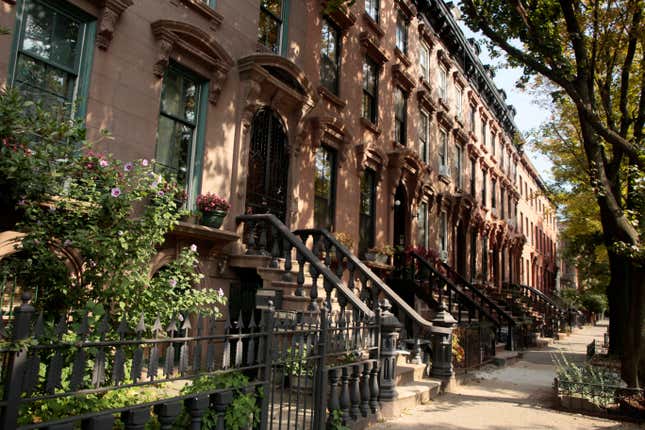
Look at any map of a rapidly-gentrifying city, be it New York, Miami, Atlanta or Washington, D.C., and you’re looking at a map of property loss. In Brooklyn’s historically black neighborhoods, some of that property loss is outright theft.
According to a New York Times report published Monday, the borough accounts for nearly half of New York City’s 3,000 deed fraud complaints since 2014—despite accounting for about a third of the city’s total housing units. Many of the targets are longtime black residents, who are deceived or coerced into signing over ownership of their properties for ludicrously low sums.
That’s what happened to Broadies Byas’ gorgeous Victorian townhouse. First constructed in 1856, her father purchased the home in 1957 for $7,500. The house is currently worth $1.2 million; unbeknownst to her, Byas had given it away for just $120,000.
In Byas’ case, and in many more situations like hers, scammers will get homeowners to sign documents they believe is financial assistance to help pay back property taxes, sewage charges, or other administrative fines. Those documents turn out to be property deeds, the Times writes.
The men described themselves as foreclosure specialists who helped property owners with loan modifications or promised that they would be able to transfer their properties to trusted relatives to avoid losing their homes.
Homeowners were encouraged to sign documents that were later used as proof they had agreed to sell their homes to Launch Development, prosecutors said.
The company also deceived banks into approving the sale of homes by providing falsified documents, including paperwork edited or completed after homeowners had signed them.
The crime has become increasingly common in Brooklyn, one of the most rapidly gentrifying areas in the country. Majority-black neighborhoods like Bedford-Stuyvesant and Crown Heights are “hotbeds” for deed theft, the Times reports; black residents in Prospect Heights, Brownsville, and East New York have also been targeted.
Not only is the crime relatively easy to pull off, but it can also be difficult to catch.
From the Times:
Some homeowners may not even know that their deeds have been stolen, the authorities say. Documents proving the sale of a property are recorded by the city registrar’s office, but not necessarily checked to ensure that they are legitimate. Owners might continue paying the mortgage for a property they no longer own.
...
Recovering a home whose deed has been illegally transferred can be difficult unless there is clear proof of wrongdoing, like a forged signature. In one case, the authorities arrested a man accused of committing fraud because the signature on a deed came from someone who had been dead for years.
It is also challenging to determine whether the person had entered a bad, but not necessarily fraudulent, financial deal. “It’s often a very hard line to straddle,” said Noelle Eberts, a lawyer at the New York Legal Assistance Group who represents Ms. Byas.
“Deed theft has become a common tool of career criminals and unscrupulous real estate developers to illegally obtain real estate, most often with the goal of selling it at a huge profit in high-demand housing markets,” Letitia James, the state attorney general, told the Times in an email.
“It is, in fact, easier to steal ownership of a home than actually burglarizing it,” Travis Hill, who oversees real estate fraud for James’ office, told the paper.
Deed theft has hit black Americans throughout the country for generations, costing communities hundreds of thousands of acres of land and an untold amount of wealth. Different investigations into black land theft, thanks in part to a revitalized conversation around reparations, have made headlines in recent months.
Lizzie Presser, in a piece co-published by ProPublica and the New Yorker, documented one North Carolina family’s fight to reclaim 65 acres of waterfront property. The land was purchased a hundred years ago by a great-grandfather who was just one generation removed from slavery; through a series of slippery legal maneuvers, the land is now in the hands of developers.
The September cover story of the Atlantic, written by Vann Newkirk, also focused on land loss and property theft—this time in the Mississippi delta. Citing numbers from the Census of Agriculture, black farmers lost almost 800,000 acres of land in Mississippi between 1950 and 1964—in 2019 dollars, that’s an estimated $6.6 billion in property and income loss.
But as Newkirk notes, loss of land isn’t confined to dollars and cents—there are immense political implications. “Were it not for dispossession, Mississippi today might well be a majority-black state, with a radically different political destiny,” he writes.
The likely endgame for fraudulent New York City developers isn’t explicitly to create majority white-neighborhoods; it’s to turn a quick buck. That their come-up could cost Brooklyn its most devoted and undervalued residents—and stymie whatever social and political power they can amass—is hardly a concern.



